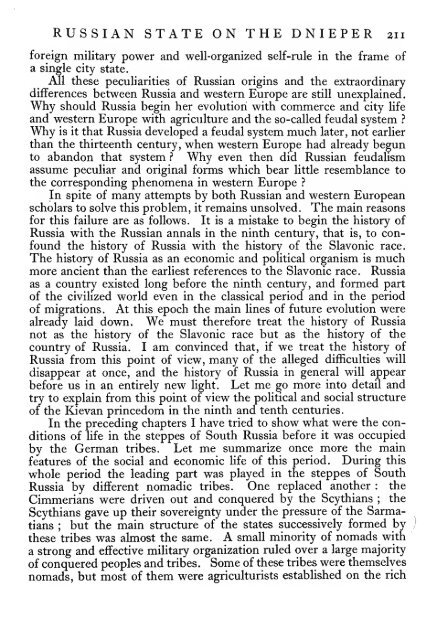Iranians and Greeks in South Russia - Robert Bedrosian's Armenian ...
Iranians and Greeks in South Russia - Robert Bedrosian's Armenian ...
Iranians and Greeks in South Russia - Robert Bedrosian's Armenian ...
Create successful ePaper yourself
Turn your PDF publications into a flip-book with our unique Google optimized e-Paper software.
RUSSIAN STATE ON THE DNIEPER 211<br />
foreign military power <strong>and</strong> well-organized self-rule <strong>in</strong> the frame of<br />
a s<strong>in</strong>gle city state.<br />
All these peculiarities of <strong>Russia</strong>n orig<strong>in</strong>s <strong>and</strong> the extraord<strong>in</strong>ary<br />
differences between <strong>Russia</strong> <strong>and</strong> western Europe are still unexpla<strong>in</strong>ed.<br />
Why should <strong>Russia</strong> beg<strong>in</strong> her evolution with commerce <strong>and</strong> city life<br />
<strong>and</strong> western Europe with agriculture <strong>and</strong> the so-called feudal system ?<br />
Why is it that <strong>Russia</strong> developed a feudal system much later, not earlier<br />
than the thirteenth century, when western Europe had already begun<br />
to ab<strong>and</strong>on that system ? Why even then did <strong>Russia</strong>n feudalism<br />
assume peculiar <strong>and</strong> orig<strong>in</strong>al forms which bear little resemblance to<br />
the correspond<strong>in</strong>g phenomena <strong>in</strong> western Europe ?<br />
In spite of many attempts by both <strong>Russia</strong>n <strong>and</strong> western European<br />
scholars to solve this problem, it rema<strong>in</strong>s unsolved. The ma<strong>in</strong> reasons<br />
for this failure are as follows. It is a mistake to beg<strong>in</strong> the history of<br />
<strong>Russia</strong> with the <strong>Russia</strong>n annals <strong>in</strong> the n<strong>in</strong>th century, that is, to confound<br />
the history of <strong>Russia</strong> with the history of the Slavonic race.<br />
The history of <strong>Russia</strong> as an economic <strong>and</strong> political organism is much<br />
more ancient than the earliest references to the Slavonic race. <strong>Russia</strong><br />
as a country existed long before the n<strong>in</strong>th century, <strong>and</strong> formed part<br />
of the civilized world even <strong>in</strong> the classical period <strong>and</strong> <strong>in</strong> the period<br />
of migrations. At this epoch the ma<strong>in</strong> l<strong>in</strong>es of future evolution were<br />
already laid down. We must therefore treat the history of <strong>Russia</strong><br />
not as the history of the Slavonic race but as the history of the<br />
country of <strong>Russia</strong>. I am conv<strong>in</strong>ced that, if we treat the history of<br />
<strong>Russia</strong> from this po<strong>in</strong>t of view, many of the alleged difficulties will<br />
disappear at once, <strong>and</strong> the history of <strong>Russia</strong> <strong>in</strong> general will appear<br />
before us <strong>in</strong> an entirely new light. Let me go more <strong>in</strong>to detail <strong>and</strong><br />
try to expla<strong>in</strong> from this po<strong>in</strong>t of view the political <strong>and</strong> social structure<br />
of the Kievan pr<strong>in</strong>cedom <strong>in</strong> the n<strong>in</strong>th <strong>and</strong> tenth centuries.<br />
In the preced<strong>in</strong>g chapters I have tried to show what were the conditions<br />
of life <strong>in</strong> the steppes of <strong>South</strong> <strong>Russia</strong> before it was occupied<br />
by the German tribes. Let me summarize once more the ma<strong>in</strong><br />
features of the social <strong>and</strong> economic life of this period. Dur<strong>in</strong>g this<br />
whole period the lead<strong>in</strong>g part was played <strong>in</strong> the steppes of <strong>South</strong><br />
<strong>Russia</strong> by different nomadic tribes. One replaced another : the<br />
Cimmerians were driven out <strong>and</strong> conquered by the Scythians ; the<br />
Scythians gave up their sovereignty under the pressure of the Sarmatians<br />
; but the ma<strong>in</strong> structure of the states successively formed by<br />
these tribes was almost the same. A small m<strong>in</strong>ority of nomads with<br />
a strong <strong>and</strong> effective military organization ruled over a large majority<br />
of conquered peoples <strong>and</strong> tribes. Some of these tribes were themselves<br />
nomads, but most of them were agriculturists established on the rich

















